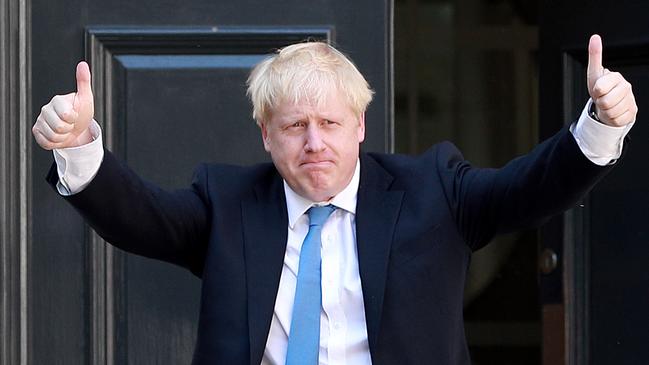Iran crisis looms as Boris Johnson’s first big test as PM
The new Prime Minister’s dealings in the Gulf’s geopolitical tangle will set the tone of his administration.

Boris Johnson has had no honeymoon period, but plenty of practice as a former foreign minister, to recognise that the simmering Persian Gulf crisis with Iran is about to quickly define where he wants Britain in the world.
The new Prime Minister’s dealings in the Gulf’s geopolitical tangle will set the tone of his administration and have long-lasting consequences about its robust friendship with the US and European countries — Brexit withstanding.
Under Mr Johnson, the British relationship with the US, Australia and other Commonwealth counties is set to strengthen even more, partly because of Mr Johnson’s own biases.
He loves the Australian can-do spirit and refers to it often, wanting a similar upbeat attitude in Britain. He trusts Australia’s astuteness in regards to global affairs and the Five Eyes intelligence arrangement, which includes Australia and Britain.
Initially Mr Johnson was critical of Donald Trump, particularly when he was a candidate before the 2016 US election, but his tone has since mollified and the US President sees a partial image of himself in the New York-born Mr Johnson.
“Boris will be great,” Mr Trump tweeted after the former foreign secretary won the Tory leadership on Tuesday.
Mr Trump sees Britain as a crucial pressure point against Russia, and also to force European nations to contribute more of their defence budgets to NATO. He also appreciates that Brexit turns Britain away from German influence.
For years, Mr Johnson has been strident about Britain wanting autonomy and the legal freedom from the EU’s justice system, and a distancing from the EU’s lofty concept of a European army.
Now it has a British-flagged oil tanker missing under the watch of the Royal Navy — and also that of Foreign Secretary Jeremy Hunt. How the new Prime Minister handles this international crisis will immediately signal his global priorities.
Defence cuts in the past decade have decimated the once grand fleet of British naval capacity to just 19 ships, and after Iran seized the Stena Impero at the weekend, Veterans Minister Tobias Ellwood insisted Britain didn’t have enough assets to escort individual tankers.
Australia immediately offered to help. Scott Morrison’s enthusiastic reaction to Mr Johnson’s appointment underscores an ever-broadening relationship with Britain. Some of Britain’s ships are now plying the Indo-Pacific, the first time in a generation.
The British-Australian relationship is robust and Britain is supportive of Australia’s caution about Chinese influence.
It could be that one of the first Johnson moves is to restrict Huawei’s involvement in Britain’s 5G telecommunications network, given the robust displeasure about it by Australia and the US.
Mr Johnson is also keen to spark the British economy and some of that future spending may boost its defensive capabilities.
The Theresa May cabinet called earlier this week for help from Europe to put together a maritime protection mission to protect international shipping from Iran’s aggression as it navigates the Straits of Hormuz.
Britain has had a different policy on Iran than that of the US, and Mr Johnson will also try to tread a fine line of maintaining independence from the US sanctions policy, yet be supportive of other US demands, such as classifying Hezbollah as a terrorist organisation.
There is already a Europe coalition naval presence off Somalia to protect ships from piracy, and Britain wants some burden-sharing from countries such as France, Norway and The Netherlands to help protect their own EU interests.
The strategy is twofold: to demonstrate that Britain in a post-Brexit world will still honour defence ties with its neighbours and to encourage regional co-operation on this particular thorny issue.
When royal marines stormed the fully laden oil tanker Grace 1 off Gibraltar earlier this month, Iran believed Britain was doing the bidding of the US and did not believe the UK’s argument that it was enforcing an EU embargo on Syrian imports. Yet Britain appeared caught by surprise at the tit-for-tat move by Iran.
The British are looking to shore up their allies in the Middle East, such as Bahrain, where they have military base HMS Jufair, as well as with Saudi Arabia and Qatar.
So far they have asked the Americans — who have an aircraft carrier strike force in the Gulf — to stay out of the tanker crisis to enable a diplomatic solution.
Earlier this week the US Central Command repeated that it wanted to establish Operation Sentinel to “to increase surveillance of and security in key waterways in the Middle East to ensure freedom of navigation in light of recent events in the Arabian Gulf region’’.
It said, pointedly, that while the US committed to supporting this initiative, “contributions and leadership from regional and international partners will be required to succeed’’.
No doubt such questions might have been raised in the congratulatory phone call from Mr Trump after Mr Johnson saw the Queen.



